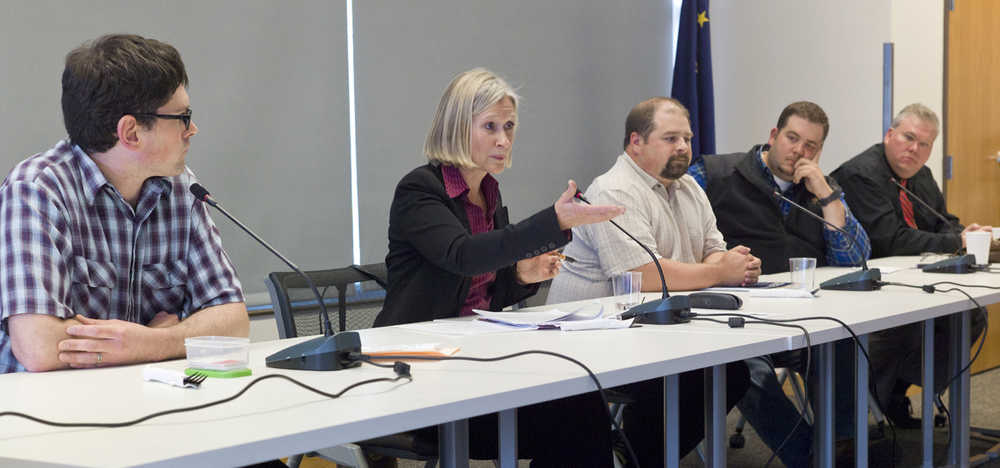It’s all about the kids, but being on the school board is also a balancing act with an ever-shrinking budget countered by expanding community needs. Who would want to take on such a job, and could they handle it?
A weekly luncheon by the Juneau Chamber of Commerce gave the five school board candidates an opportunity to present their cases to a full room of business leaders as to why they should be placed in charge of public education in Alaska’s capital city.
While several responses were given to describe overall objectives, candidate and 12-year-veteran board member Andi Story’s remarks echoed the sentiment of all on the panel.
“First and foremost is the quality of education for our kids,” she said.
Achieving that quality of education is where the candidates began to take different routes. While Story continued her platform to invest in teachers’ professional development, some came to the table with blueprints for new ways to address crowded classrooms.
Candidate Emil Mackey, whose professional background includes administrative work in the University of Alaska and University of Arkansas systems, presented a solution to the popular high school campuses debate.
“We’ve got two high schools, and I’m not going to at all get into the debate of whether we should close one, I think that debate’s passed,” Mackey said. “What I do believe though is that since they’re running at basically three-fifths capacity, we should probably look at more creative use of our total infrastructure around the district.”
This new infrastructure, Mackey explained, includes combining the junior high and high school grade levels, freeing middle school space for elementary use.
While Mackey’s was the most drastic change suggested, it was born from a popular concern by all candidates — preparing students as early as possible for life after a degree.
Candidate Josh Keaton presented data to those in attendance that rang alarms about student readiness for the real world.
“Juneau has the lowest college preparation level that’s measured by graduates that are eligible for the Alaska Performance Scholarship (APS) for the big five districts in the larger Southeast,” he said.
According to a report by the APS, in 2014, 25 percent of Juneau students were eligible for aid from APS, the lowest figure for schools in Southeast Alaska.
Story celebrated the recent increase in the graduation rate, but expressed concerns similar to Keaton’s.
“Our graduation rate is its highest ever, 87 (percent), but are kids really college ready? They’re graduating, but are they ready?” Story asked.
According to data from the Juneau School District, the rate of graduation in 2014 was 80 percent. Candidate Story was referring to JSD’s five-year graduation rate.
On the topic of after high school success, Mackey introduced the possibility of optional tracks for students concerned with college versus technical trades, allowing each student to focus on what they find motivating.
All these suggestions, as Mackey pointed out, are only priorities, not campaign promises. When moderator Eric Eriksen turned the questions over to the audience, candidates had to consider how they could make so much “more” happen when so often “less” is what the board has to work with financially.
“I cannot spin straw into gold,” Story said. “I wish we had more administrative cuts to make, because that would make it easy, and we’ve tried to make our cuts at the administrative level and we’re really down to bare bones.”
Candidate Jeff Redmond, a Juneau resident for two years and a University of Alaska Southeast student, said one way to address budget issues is to stop unnecessary growth.
“It’s my position that we need to keep in check the expansion of our charter school and side schools,” Redmond said. “I think the ones that we have now do need to be funded properly and to continue to expand may be a misstep.”
One budget concern for candidate Jason Hart, a youth soccer and baseball coach, was restricted travel for middle school sports. Hart said he felt the moratorium put in place in fall 2013 could be lifted with a net neutral outcome on the board’s budget.
Former board member Sally Saddler was in the audience Thursday and presented information for the candidates to consider. Only 35 to 45 percent of students in the district are reading and writing competent for their appropriate grade level. The goal of the board, Saddler said is to guide the district in achieving its goal of bringing the remaining 55 to 65 percent up to par, and not leaving them behind. How, Saddler asked, could they make a real change?
Keaton said the complex question could be answered in students’ homes.
“As a school district, we need to be encouraging … learning at home as well to try and bring some of those students up,” Keaton said, adding that he uses the Khan Academy web tool with his children. “We need to encourage and work as a community to encourage parents to continue that education at home and not place all the blame of students not meeting a certain reading level on the teachers’ backs.”
After the panel, Saddler said she wasn’t exactly satisfied with answers to her question because “specifics” were missing in all the answers. She said the reason she asked it to begin with was to make sure these candidates realized the scope of what they were signing up for.
“I want my candidates to go into this eyes wide open,” Saddler said.
Additional questions prepared by the chamber and answered by the candidates in advance of the panel will be available to view at juneauchamber.com at a later date.
• Contact reporter Paula Ann Solis at 523-2272 or at paula.solis@juneauempire.com.

